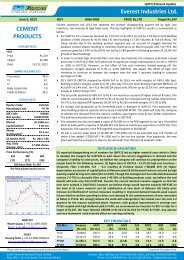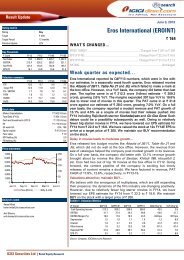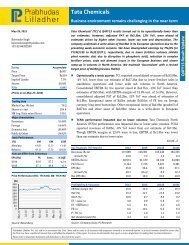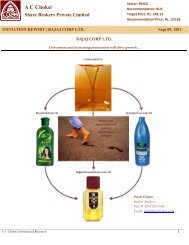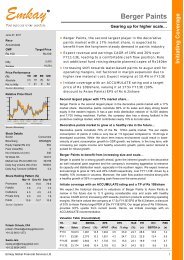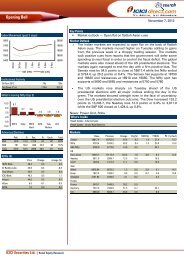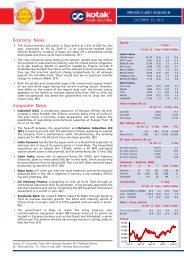will government's massive surge in investment ... - Myiris.com
will government's massive surge in investment ... - Myiris.com
will government's massive surge in investment ... - Myiris.com
Create successful ePaper yourself
Turn your PDF publications into a flip-book with our unique Google optimized e-Paper software.
Apr-Jun 2013 Earn<strong>in</strong>gs Preview<br />
Export‐parity pric<strong>in</strong>g likely to be adopted <strong>in</strong><br />
place of import/trade parity<br />
Fuel subsidy bill of Rs 1610 bn would have<br />
been lower by Rs 176 bn <strong>in</strong> FY13 on export<br />
parity pric<strong>in</strong>g<br />
The F<strong>in</strong>ance M<strong>in</strong>istry has been successful <strong>in</strong> alter<strong>in</strong>g the mandate of the Kirit Parekh<br />
Committee constituted to suggest a suitable pric<strong>in</strong>g mechanism for petro-products<br />
from import/trade parity to export-parity. Currently diesel is priced at trade parity,<br />
80% import and 20% export. LPG and kerosene are priced at import parity. The<br />
F<strong>in</strong>ance M<strong>in</strong>istry wants diesel and kerosene to be priced on import parity and LPG<br />
pric<strong>in</strong>g to be based on a mix of 60% exports and 40% import parity rates. A shift to<br />
export parity would have lead to a reduction <strong>in</strong> diesel subsidies by Rs 143.72 bn to Rs<br />
776.89 bn <strong>in</strong> FY13. LPG and kerosene subsidies would have <strong>com</strong>e down by Rs 22.45<br />
bn and Rs10 bn respectively. Total subsidy sav<strong>in</strong>gs would have been Rs 176.18 bn<br />
from FY13’s total fuel subsidy bill of Rs 1610.29 bn. In April 2013, the Budget had<br />
estimated fuel subsidy bill for FY14 at Rs 800 bn which has swollen to Rs 1250bn due<br />
to the sharp slide <strong>in</strong> the Rupee and <strong>in</strong>crease <strong>in</strong> under-recoveries despite small<br />
monthly <strong>in</strong>creases of Rs 0.50/litre <strong>in</strong> diesel prices.<br />
Food Security Ord<strong>in</strong>ance promulgated<br />
regarded as “game changer” by a section<br />
of the poll‐bound Congress Party<br />
67% of population legally entitled to get<br />
5kgs of food gra<strong>in</strong>s per person per month.<br />
(Rice at Rs3/kg, Wheat at Rs2/kg or Millets<br />
at Rs1/kg)<br />
Foodgra<strong>in</strong> requirement estimated at 612.3<br />
lakh tones per year.<br />
Food Subsidy bill to bloat by 25% to 1.25<br />
lakh crores<br />
Food Security Ord<strong>in</strong>ance promulgated- 25% rise <strong>in</strong> annual fuel subsidies likely,<br />
populist measure widely regarded as “game-changer” by a section of the poll-bound<br />
Congress Party The government has promulgated an ord<strong>in</strong>ance on food security that<br />
seeks to give a legal right to monthly food handouts to 67% of the population (75%<br />
of rural and 50% of urban population) or approximately 800 mn people at a fraction<br />
of their market price. Government <strong>will</strong> supply rice at Rs 3/kg, wheat at Rs 2/kg and<br />
millets at Re 1/kg. People would be entitled to 5 kg of subsidised gra<strong>in</strong> per month.<br />
The total estimated foodgra<strong>in</strong>s requirement is 612.3 lakh tonnes per year. The law<br />
<strong>com</strong>es <strong>in</strong>to effect immediately but has provided States six months w<strong>in</strong>dow to<br />
identify the eligible households <strong>in</strong> a fair and transparent manner. The annual food<br />
subsidy bill is expected to swell to Rs 1.25 lakh crores. Government has provided Rs 1<br />
lakh crore provided <strong>in</strong> the FY14 Budget as food subsidy but the full impact <strong>will</strong> be felt<br />
only <strong>in</strong> FY15 when all the States start the rollout after identify<strong>in</strong>g eligible<br />
beneficiaries. The poorest-of-poor 24.3 mn families covered under the Antyodaya<br />
Anna Yojana (AAY) scheme under the PDS would cont<strong>in</strong>ue to get legal entitlement of<br />
35 kg of foodgra<strong>in</strong>s per family per month.<br />
Food security concerns‐ Bloated subsidy<br />
burden hitt<strong>in</strong>g fiscal health, squeez<strong>in</strong>g of<br />
private traders by FCI, shift <strong>in</strong> cropp<strong>in</strong>g<br />
patterns endanger<strong>in</strong>g foodgra<strong>in</strong>s<br />
production & <strong>in</strong>creased leakages<br />
There are concerns that private gra<strong>in</strong> traders <strong>will</strong> be squeezed out of the market by<br />
the government-owned Food Corporation of India (FCI). Also, some farmers may<br />
shift to other remunerative crops and fulfil their own requirements through<br />
subsidized gra<strong>in</strong>s affect<strong>in</strong>g foodgra<strong>in</strong> output. The dangers of leakages and other<br />
malpractices cannot be ruled out. Any substantial rise <strong>in</strong> food subsidy bill would<br />
pressurize the government’s already precarious fiscal situation. The government<br />
needs to get this cleared <strong>in</strong> the Parliament with<strong>in</strong> six weeks of Parliament’s next<br />
sitt<strong>in</strong>g.<br />
July 8, 2013 15



